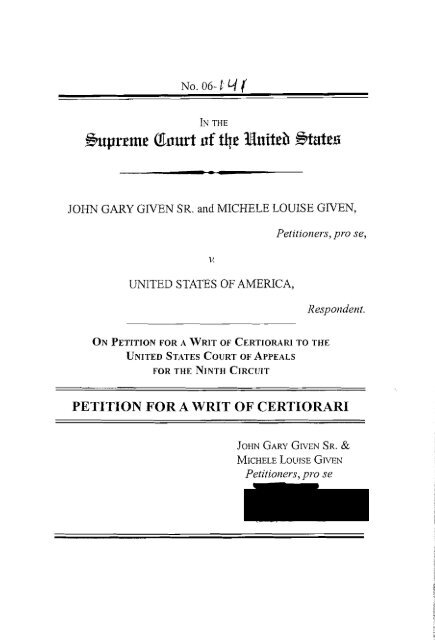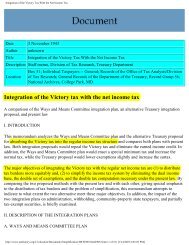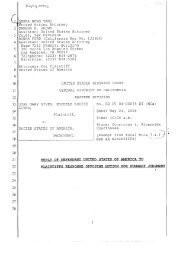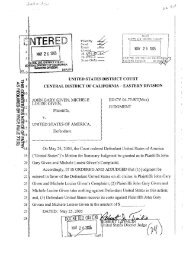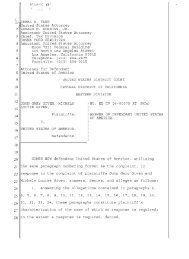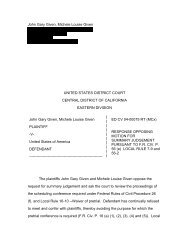Petition for Writ of Certiorari, Supreme Court Docket 06-141
Petition for Writ of Certiorari, Supreme Court Docket 06-141
Petition for Writ of Certiorari, Supreme Court Docket 06-141
You also want an ePaper? Increase the reach of your titles
YUMPU automatically turns print PDFs into web optimized ePapers that Google loves.
No. <strong>06</strong>- t L1 (<br />
IN THE<br />
.§uprttne atIlurt nf tlTe 1!tniteo §tates<br />
•<br />
JOHN GARY GNEN SR. and MICHELE LOUISE GNEN,<br />
<strong>Petition</strong>ers, pro se,<br />
UNITED STATES OF AMERICA,<br />
Respondent.<br />
ON PETITION FOR A \VRIT OF CERTIORARI TO THE<br />
UNITED STATES COURT OF ApPEALS<br />
FOR THE NINTH CIRCUIT<br />
PETITION FOR A WRIT OF CERTIORARI<br />
JORN GARY GIVEN SR. &<br />
MICHELE LOUISE GIVEN<br />
<strong>Petition</strong>ers, pro se
i<br />
QUESTIONS PRESENTED FOR REVIEW<br />
The <strong>Supreme</strong> <strong>Court</strong> in Commissioner v. Tellier, 383 U.S.<br />
687 (1966), held that the federal income tax is imposed upon<br />
"net income," not gross receipts. I<br />
Our questions, there<strong>for</strong>e, concern the statutory classification<br />
<strong>of</strong> the common law, labor <strong>for</strong> hire employee, <strong>for</strong> income and<br />
employment tax purposes, in relation to that decision.<br />
1. Does the statutorily defined classification <strong>of</strong> "person,"<br />
under either 26 U.S.c. § 7701 (a) (1): 26 C.ER. 301.7701-1, <br />
2, -3, -6; or 26 C.ER. 31.0-2 (a) (8), include the common law,<br />
labor <strong>for</strong> hire employee? 2<br />
1. We held that, were we to 'en<strong>for</strong>ce as federal policy the rule<br />
espoused by the Commissioner in this case, we would come<br />
close to making this type <strong>of</strong> business taxable on the basis<br />
<strong>of</strong> its gross receipts, while all other business would be<br />
taxable on the basis <strong>of</strong> net income'. If that choice is to be<br />
made, Congress should do it.<br />
383 U.S. 687, 692. See also footnote 11.<br />
2. "When used in this title, where not otherwise distinctly expressed<br />
or manifestly incompatible with the intent there<strong>of</strong>-(l) Person.<br />
The term 'person' shall be construed to mean and include an individual,<br />
a trust, estate, partnership, association, company or corporation."<br />
26 U.S.C. § 7701(a)(I).<br />
Discovery <strong>of</strong>liability and en<strong>for</strong>cement <strong>of</strong> Title, 26CFR301,7701-2<br />
(a) Business entities. "... A business entity with only one owner is<br />
classified as a corporation or is disregarded; if the entity is disregarded,<br />
its activities are treated in the same manner as a sole-proprietorship,<br />
branch, or division <strong>of</strong> the owner."<br />
General definitions and use <strong>of</strong> terms. 26 C.F.R. 31.0-2(a)<br />
In general. As used in the regulations in this part, unless otherwise<br />
expressly indicated---{l) The terms defined in the provisions <strong>of</strong> law<br />
contained in the regulations in this part shall have the meanings so<br />
assigned to them. (8) Person includes an individual, a corporation, a<br />
partnership, a trust or estate, a joint-stock company,'an association, or a<br />
(Cont'd)
II<br />
If so: does the treatment <strong>of</strong> employee related business<br />
expenses "below the line" ("the line" being a reference to line<br />
22 "total income" on the 1040 Tax Return), while all other<br />
business owners deduct their related business expenses above<br />
the line, comply with the due process requirements <strong>of</strong> the<br />
Constitution? 3<br />
Ifnot, is there any statutory requirement <strong>for</strong> such employees<br />
to file a W-4 Certificate and there<strong>for</strong>e pay the income tax based<br />
solely upon their annual receipts (whole income)?<br />
And if not, are the provisions <strong>of</strong> 26 U.S.C. § 640l(c)<br />
applicable to the "honest mistake" <strong>of</strong> filing the W-4 and the<br />
payment <strong>of</strong> the tax?"<br />
(Cont'd)<br />
syndicate, group, pool, joint venture or other unincorporated organization<br />
or group, through or by means a/which any business.financial operation,<br />
or venture is carried on."<br />
3. It is apparent that the mere fact <strong>of</strong> classification is not<br />
sufficient to relieve a statute from the reach <strong>of</strong> the equality<br />
clause <strong>of</strong> the fourteenth amendment, and that in all cases it<br />
must appear not only that a classification has been made,<br />
but also that it is one based upon some reasonable ground,<br />
-some difference which bears a just and proper relation to<br />
the attempted classification, -[165 U.S. 150, 166J and is<br />
not mere arbitrary selection.<br />
Gulf, C. & S. FR. Co. v. Ellis, 165 U.S. 150, 165, 166 (1895).<br />
4. Rule where no tax liability<br />
Section 4 (d) <strong>of</strong> the Senate bill adds new subsection (c)<br />
to section 3770 <strong>of</strong>the code. Under this provision an amount<br />
paid as tax shall not be considered not to constitute an<br />
overpayment solely because there was no tax liability in<br />
respect <strong>of</strong> which that amount was paid. The income-tax<br />
law requires the taxpayer to make a return <strong>of</strong> his tax and to<br />
pay the tax so returned. These requirements contemplate<br />
that in the discharge <strong>of</strong> these duties at the time, place, and<br />
manner prescribed, honest mistakes will occur-s-mistakes<br />
(Cont'd)
iii<br />
2. We have paid the tax in question and come be<strong>for</strong>e the<br />
<strong>Court</strong> with clean hands. There<strong>for</strong>e, are the frivolous penalties<br />
assessed against us properly imposed according to the provisions<br />
<strong>of</strong>26 U.S.C. § 6702(a)?<br />
(Cant' d)<br />
both as to the amount <strong>of</strong> the tax and as to the existence <strong>of</strong><br />
any tax liability; and that such honest mistakes made<br />
incident to the bona fide orderly compliance with the actual<br />
or reasonably apparent duties <strong>of</strong> the taxpayer are to be<br />
corrected under the provisions <strong>of</strong> law governing<br />
overpayments. It is believed that existing law so provides.<br />
The language <strong>of</strong>certain court decisions (holding that certain<br />
payments, not made incident to a bona fide and orderly<br />
discharge <strong>of</strong> actual or reasonably apparent duties imposed<br />
by law, are not overpayments and accordingly that interest<br />
is not payable) has been read by some as meaning that no<br />
payment can result in an overpayment if no tax liability<br />
actually existed. It is not believed that such reading is in<br />
any way a statement <strong>of</strong> existing law. The provisions <strong>of</strong> the<br />
bill, however, emphasize the need <strong>for</strong> clarity in this regard.<br />
Under the bill as passed by the Senate, two requirements<br />
became basic features <strong>of</strong>the income tax: (1) The declaration<br />
and payment <strong>of</strong> the estimated tax; and (2) the withholding<br />
and collection by the employer <strong>of</strong> tax from the wages <strong>of</strong><br />
employees, and the return and payment as such <strong>of</strong> the<br />
amount by the employer to the Government. Honest<br />
mistakes incident to faithful and orderly compliance will,<br />
<strong>of</strong> course, occur, just as they have in the older procedures<br />
<strong>of</strong> the law.<br />
Conference Report #510, 78th Congress, 1st Session, May 28, 1943,<br />
H.R. 2570, Current Tax Payment Act <strong>of</strong> 1943, page 48.
iv<br />
TABLE OF CONTENTS<br />
Page<br />
Questions Presented <strong>for</strong> Review .<br />
Table <strong>of</strong> Contents .<br />
Table <strong>of</strong> Cited Authorities .<br />
Table <strong>of</strong> Appendices .<br />
Opinion Below<br />
Jurisdiction ...............................................................<br />
Constitutional and Statutory Provisions Involved ....<br />
Statement <strong>of</strong> Case<br />
Reasons <strong>for</strong> Granting the <strong>Petition</strong> .<br />
Conclusion .................................................................
v<br />
TABLE OF CITED AUTHORITIES<br />
Page<br />
Cases:<br />
Brushaber v. Union Pacific R.R.,<br />
240 U.S. 1 (1915)<br />
Commissioner v. Tellier,<br />
383 U.S. 687 (1966)<br />
. 2<br />
i, 3, 5<br />
Gulf, C. & S. F. R. Co. v. Ellis,<br />
165 U.S. 150 (1895)<br />
Heiner v. Donnan,<br />
285 U.S. 312 (1932)<br />
.<br />
.<br />
11<br />
6<br />
Jarecki v. aD. Searle & Co.,<br />
367 U.S. 303 (1961)<br />
Noland v. C.I.R.,<br />
269 F.2d 108 (1959)<br />
. 4<br />
5<br />
Pittsburgh v. Alco Parking Corp.,<br />
417 U.S. 369 (1974) 5<br />
Pollock v. Farmers Loan and Trust,<br />
158 U.S. 601 (1894) 2,3<br />
Steward Machine Co. v. Davis,<br />
301 U.S. 548 (1937) 3<br />
Train v. Colorado Pub. Int. Research Group,<br />
426 U.S. 1 (1976) 2
vi<br />
CitedAuthorities<br />
United States v. Gilmore,<br />
372 U.S. 39 (1963) .<br />
United States v. Morris,<br />
125 F. 322 (1903) .<br />
United States v. Romano,<br />
382 U.S. 136 (1965) .<br />
Page<br />
5<br />
4<br />
6<br />
United States Constitution:<br />
16 th Amendment .<br />
Article 1, Section 8, clause 1<br />
Article 1, Section 9, clause 4<br />
1<br />
1<br />
1<br />
Statutes and Regulations:<br />
Conference Report #510, 78th Congress, 1st Session,<br />
May 28, 1943, H.R. 2570, Current Tax Payment<br />
Act <strong>of</strong> 1943 . . . . . . . . . . . . . . . . . . . . . . . . . . . . . .<br />
Income Tax Regulation 118, C.P.R. (1939) Part 39,<br />
Dec. 31,1951 (U.S. Code and Congressional News,<br />
1956 Edition, p. 453)<br />
Public Law 68, 57 Stat. 126, Ch. 120, June 9, 1943;<br />
H.R. 2570; House Report No. 401, April 30, 1943;<br />
H.R. 2570; Senate Report No. 221, May 10,1943;<br />
H.R. 2570; Conference Report No. 510, May 28,<br />
1943; H.R. 2570<br />
iii<br />
4<br />
4, 5
vii<br />
TABLE OF APPENDICES<br />
Appendix A Judgment And Memorandum Opinion<br />
Of The United States <strong>Court</strong> Of Appeals For The<br />
Ninth Circuit Filed And Entered January 27, 20<strong>06</strong><br />
Appendix B Order Of The United States District<br />
<strong>Court</strong> For The Central District Of Cali<strong>for</strong>nia,<br />
Eastern Division Dated May 24, 2005<br />
Appendix C -Order Of The United States <strong>Court</strong> Of<br />
Appeals For The Ninth Circuit Denying <strong>Petition</strong><br />
For Rehearing Filed April 27, 20<strong>06</strong><br />
Page<br />
la<br />
4a<br />
lOa
1<br />
<strong>Petition</strong>ers John Gary Given Sf. and Michele Louise<br />
Given respectfully petition the <strong>Court</strong> <strong>for</strong> a writ <strong>of</strong> certiorari<br />
to review the judgement <strong>of</strong>the United States <strong>Court</strong> <strong>of</strong>Appeals<br />
<strong>for</strong> the Ninth Circuit in this case.<br />
OPINION BELOW<br />
The opinion <strong>of</strong> the United States <strong>Court</strong> <strong>of</strong> Appeals <strong>for</strong><br />
the Ninth Circuit is unpublished. The case number is 05<br />
55954.<br />
JURISDICTION<br />
The Judgment <strong>of</strong> the United States <strong>Court</strong> <strong>of</strong> Appeals <strong>for</strong><br />
the Ninth Circuit was issued on January 27, 20<strong>06</strong> and the<br />
petition <strong>for</strong> rehearing en bane was denied on April 27, 20<strong>06</strong>.<br />
This <strong>Court</strong> has jurisdiction over the petition under 28 U.S.C.<br />
§ 1254(1).<br />
CONSTITUTIONAL AND STATUTORY<br />
PROVISIONS INVOLVED<br />
Article 1, Section 8, clause 1 requires all excise, impost<br />
or duty taxes to be uni<strong>for</strong>m throughout the United States.<br />
Article 1, Section 9, clause 4 requires all "direct" taxes<br />
to be apportioned.<br />
The 16 th Amendment provides <strong>for</strong> the taxation <strong>of</strong>income<br />
"derived from" whatever source, or sources, involved.<br />
Title 26 U.S.C. § 1 provides that the tax is imposed upon<br />
"taxable income."<br />
Title 26 U.S.c. § 7701 identifies the classification <strong>of</strong><br />
"persons" made liable <strong>for</strong> the tax.<br />
Title 26 U.S.C. § 3401(a) defines "wages" subject to<br />
employment taxes.<br />
Title 26 C.F.R. 301. 7701-1,-2,-3,-6 defines the<br />
classification <strong>of</strong> "persons". upon whom the Tax Code<br />
operates.
2<br />
Title 26 C.F.R. 31.3401 (a) -1 defines the meaning <strong>of</strong><br />
"wages".<br />
Title 26 C.ER. 31.0-2 (a) (8) defines the term "person"<br />
applicable to the employment taxes imposed by Subtitle C <strong>of</strong><br />
the Internal Revenue Code.<br />
Title 26 U.S.C. § 6401 (c) provides the "rule where no tax<br />
liability".<br />
STATEMENT OF CASE<br />
This case involves a suit <strong>for</strong> refund under 26 U.S.C.<br />
§ 6401(c) "Rule where no tax liability" and the legislative intent<br />
<strong>of</strong> that provision expressed in the Revenue Act <strong>of</strong> 1943 [H.R.<br />
2570]. The courts are silent on this issue, as this question has<br />
notbeen previously raised or the legislative intent <strong>of</strong>that section<br />
presented to the court <strong>for</strong> review. 5<br />
DISCUSSION OF CASE<br />
According to Chief Justice White, in the opinion rendered<br />
by the court in Brushaber v. U.PR.R., 240 U.S. 1 at 16, the<br />
purpose at which the Pollock Case <strong>of</strong> 1894 was directed was to<br />
define the meaning <strong>of</strong>"direct tax," as used in its Constitutional<br />
sense. The definition <strong>of</strong> "direct tax," as found in Pollock v.<br />
Farmers, 158 U.S. 601 at 625-626, is:<br />
He gives, however, it appears to us, a definition<br />
which covers the question be<strong>for</strong>e us. A tax upon<br />
5. To the extent that the <strong>Court</strong> <strong>of</strong>Appeals excluded [426 U.S.<br />
1, 10J reference to the legislative history <strong>of</strong> the FWPCA in<br />
discerning its meaning, the court was in error. As we have<br />
noted be<strong>for</strong>e: 'When aid to construction <strong>of</strong> the meaning or<br />
words, as used in the statute, is available, there certainly<br />
can be no rule <strong>of</strong> law which <strong>for</strong>bids its use, however clear<br />
the words may appear on 'superficial examination'. United<br />
States v. American Trucking Assoc., 310 U.S. 534, 543<br />
544 (1940).'<br />
Train v. Colorado Pub. Int. Research Group, 426 U.S. 1,9-10 (1976).
3<br />
one's whole income is a tax upon the annual receipts<br />
from his whole property, and as such falls within<br />
the same class as a tax upon that property, and is a<br />
direct tax, in the meaning <strong>of</strong> the Constitution.<br />
Our "wages" are our only "income". Those ''wages'' are, in fact,<br />
the annual receipts produced by our property "labor", We do<br />
not believe we are "in business," as that term is used in the Tax<br />
Code or common speech and we do not believe we provide our<br />
labor <strong>for</strong> pr<strong>of</strong>it seeking endeavors.<br />
There<strong>for</strong>e, in light <strong>of</strong>the decision rendered in Commissioner<br />
v. Tellier, supra, and the definition <strong>of</strong> "direct tax" provided by<br />
the <strong>Supreme</strong> <strong>Court</strong> in the Pollock Case supra; a conflict exists<br />
as to whether a tax imposed upon "wages," as the annual receipts<br />
<strong>of</strong> labor, is an excise tax upon income or a "direct tax" upon<br />
labor under the Constitution? 6<br />
6. Ifthe Legislature were to attempt, by taxing all occupations,<br />
practically, to annul the prohibition against a poll tax, the<br />
question might arise. But there is a clear distinction between<br />
a tax upon certain specified businesses, where the skill <strong>of</strong><br />
the operator is a source <strong>of</strong> pr<strong>of</strong>it, or where the public are<br />
appealed to <strong>for</strong> patronage and protection <strong>of</strong> a fixed and<br />
regular business, and a tax covering all persons, whatever<br />
may be their occupation.... [The opinion then refers to<br />
taxes on lawyers, doctors, etc. and continues:] The skill,<br />
or education, or tact, which is the source <strong>of</strong> pr<strong>of</strong>it in these<br />
occupations, is clearly distinguishable from that capacity<br />
which is in every man to work <strong>for</strong> his support with the<br />
hands which God has given him.<br />
Burch v. Mayer, etc. <strong>of</strong>Savannah, 42 Ga. 596, 600-601 (1871). (Taxing<br />
the Exercise <strong>of</strong>Natural Rights, John MacArthur Maguire, Harvard Legal<br />
Essays 1934, page 301. This Legal Essay was cited by the U.S. <strong>Supreme</strong><br />
<strong>Court</strong> in Steward Mach. Co. v. Davis, 310 U.S. 548, 581 (1937)).<br />
This issue was first raised by Commissioner <strong>of</strong> Internal<br />
Revenue Guy T. Helvering in the 1937 case <strong>of</strong> Helvering<br />
v. Davis 301 U.S. 619, 639: "whether the validity <strong>of</strong> the<br />
tax imposed upon employees by Sec. 801 <strong>of</strong> the Social<br />
(Cont'd)
4<br />
Congress recognized the possibility <strong>of</strong> the C0Df1.l5il~D.<br />
between the two taxes in the Revenue Act <strong>of</strong>1943 andprovided<br />
an escape from the unconstitutional application <strong>of</strong> t':e to<br />
"wages," which were not "includible in gross incorne.?"<br />
The question being presented to the <strong>Court</strong> is whether or<br />
not the common law "labor <strong>for</strong> hire" employee :15 properly<br />
"classified" <strong>for</strong> tax purposes as being a business. cr pr<strong>of</strong>it<br />
seeking entity, in compliance with 26 V.S.c. § 26<br />
C.P.R. 31.0-2(a) (8). (See Jarecki v. G.D. Searle<br />
U.S. 303,307 and the maxim "noscitur a sociis).<br />
If the answer to that question is no, then Ti:~e:6. Subtitle<br />
A and C have no application to the common<br />
hire,<br />
employee having no other income than their (whole<br />
income). Such "wages," being the annual receipt's<br />
excluded from the operation <strong>of</strong> the Statute<br />
fundamental law (Regulations 118, Part 39 Sucsecncn 39.21<br />
I (a)).<br />
(Cont'd)<br />
Security Act is properly in issue in this case, and ..<br />
whether that tax is within the power <strong>of</strong>Congress under the<br />
Constitution."<br />
See also United States v. Morris, 125 F. 322, 331 (1903): 'T22t the<br />
rights to lease lands and to accept employment as a laborer <strong>for</strong> r:::"-e 2""<br />
fundamental rights, inherent in every free citizen, is indisputable."<br />
7. A clerical amendment in the House bill eliminated<br />
the provision in section 466(a) which restrict the<br />
withholding to wages includible in gross income. The same<br />
change is made in the Senate Bill. This limitation, which<br />
was designed to exclude from withholding the amount <strong>of</strong><br />
any wage payment exempted under the law from the tax<br />
imposed by chapter 1 <strong>of</strong> the code, is rendered unnecessary<br />
by the changes made in the definition <strong>of</strong> the term "wages".<br />
Conference Report No. 510, H.R. 2570, page 34. See also the Federal<br />
Register <strong>of</strong> March 31, 1943, page 3901, subsection 19.466-1(b) <strong>for</strong><br />
definition <strong>of</strong> "wages includible in gross income," and Regulations 118,<br />
39.21-1(a) Meaning <strong>of</strong> net income]
5<br />
This interpretation would be consistent with the intent <strong>of</strong><br />
Congress, as expressed in the Revenue Acts <strong>of</strong> 1942 (H.R. 7378)<br />
and 1943 (H.R. 2570). In each <strong>of</strong> those Acts, as well as be<strong>for</strong>e<br />
and after those Acts, Congress specifically allowed <strong>for</strong> the<br />
. exclusion <strong>of</strong> income exempted by the fundamental law and, in<br />
1943, provided <strong>for</strong> the "honest mistake" bound to occur in the<br />
interpretation <strong>of</strong> the law concerning such income. (See the<br />
Conference Report attached to H.R. 2570, pages 17,29,34 and<br />
48; and footnote 11 <strong>of</strong> the Tellier Case, supra).<br />
If the common law, labor <strong>for</strong> hire employee is classified as<br />
a business entity, which is suggested by several court cases",<br />
then is that classification consistent with the letter, as well as<br />
the spirit <strong>of</strong> the fundamental law? (See Billings v. People <strong>of</strong><br />
State <strong>of</strong>Illinois, 188 U.S. 97, 102 (1903) andGulj, c.& S. FR.<br />
Co., v. Ellis, 165 U.S. 150 (1897)).<br />
The reason this question is important is that the <strong>Court</strong> has<br />
consistently held that "the power to tax, is the power to destroy,"<br />
and that once the power has been confirmed the <strong>Court</strong> has no<br />
authority to limit the <strong>for</strong>ce by which that power is applied<br />
(Pittsburgh v. Alco Parking Corp., 417 U.S. 369, 376 (1974). A<br />
tax <strong>of</strong> 100% <strong>of</strong> the "net income" (taxable income) <strong>of</strong> a business<br />
entity would most likely terminate the business endeavor, but it<br />
would not necessarily bankrupt the business owner. On the other<br />
hand, a tax <strong>of</strong> 100% <strong>of</strong> the employee's "wages," as their annual<br />
receipts (taxable income), would devastate the personal life <strong>of</strong> the<br />
employee.<br />
8. "Every person who works <strong>for</strong> compensation is engaged in the<br />
business <strong>of</strong> earning his pay ..." (Noland v. CIR., 269 F.2d 108, 109,<br />
III (1959). See also Kowalski v. CIR., 65TC44 @ 63 "Over the years<br />
we have held on more than one occasion that a taxpayer may be in the<br />
trade or business <strong>of</strong> being an employee").<br />
United States v. Gilmore, 372 U.S. 39,44 (1963): "For income tax<br />
purposes Congress has seen fit to regard an individual as having two<br />
personalities: "one is [as] a seeker after pr<strong>of</strong>it who can deduct the<br />
expenses incurred in that search; the other is [as] a creature satisfying<br />
his needs as a human and those <strong>of</strong> his family but who cannot deduct<br />
such consumption and related expenditures."
6<br />
REASON FOR GRANTING THE PETITION<br />
The Constitution does not allow Congress to discriminated<br />
between members <strong>of</strong> the same class or create a statutory<br />
presumption in order to avoid constitutional restrictions placed<br />
upon taxation. Ifwe do not fall withinthe statutory classification,<br />
then Congress properly provided <strong>for</strong> such "honest mistakes" as<br />
to liability and the court must resolve the issues presented in<br />
our request <strong>for</strong> refund. (See Heiner v. Donnan, 285 U.S. 312,<br />
325-330 (1932) and United States v. Romano, 382 U.S. 136<br />
(1965)).9<br />
CONCLUSION<br />
For the <strong>for</strong>egoing reasons, the petition<strong>for</strong> a writ<strong>of</strong>certiorari<br />
should be granted.<br />
Respectfully submitted,<br />
JOHN GARY GIVEN SR. &<br />
MICHELE LmJ1SE GIVEN<br />
<strong>Petition</strong>ers, pro se<br />
9. This court has held more than once that a statute creating a<br />
presumption which operates to deny a fair opportunity to<br />
rebut it violates the due process clause <strong>of</strong> the Fourteenth<br />
Amendment. For example, Bailey v. Alabama, 219 U.S.<br />
238, et seq., 31 S. Ct. 145: Manley v. Georgia, 279 U.S. 1,<br />
5-6, 49 S. Ct. 215. 'It is apparent,' this court said in the<br />
Bailey case (219 U.S. 239, 31 S. Ct. 145, 151) 'that a<br />
constitutional prohibition cannot be transgressed indirectly<br />
by the creation <strong>of</strong> a statutory presumption any more than it<br />
can be violated by direct enactment. The power to create<br />
presumptions is not a means <strong>of</strong> escape from constitutional<br />
restrictions. '<br />
Heiner v. Donnan, 285 U.S. 312, 329 (1932).
la<br />
APPENDIX A - JUDGMENT A..ND MEMORANDUM<br />
OPINION OF THE UNITED STATES COURT OF<br />
APPEALS FOR THE NINTH CIRCUIT FILED AND<br />
ENTERED JA..NUARY 27,20<strong>06</strong><br />
UNITED STATES COURT OF APPEALS<br />
FOR THE NINTH CIRCUIT<br />
No. 05-55954<br />
D.C. No. CV-04-00075-RJT<br />
JOHN GARY GIVEN, SR.; et aI.,<br />
v.<br />
Plaintiffs - Appellants,<br />
UNITED STATESOF AMERICA,<br />
Defendant - Appellee.<br />
Appeal from the United States District <strong>Court</strong> <strong>for</strong> the Central<br />
District <strong>of</strong>Cali<strong>for</strong>nia, Riverside.<br />
This cause came on to be heard on the Transcript <strong>of</strong> the<br />
Record from the United States District <strong>Court</strong> <strong>for</strong> the Central<br />
District <strong>of</strong>Cali<strong>for</strong>nia, Riverside and was duly submitted.<br />
,<br />
On consideration where<strong>of</strong>, it is now here ordered and<br />
adjudged by this <strong>Court</strong>, that the jUd~inent <strong>of</strong>the said District<br />
<strong>Court</strong> in this cause be, and hereby is AFFIRMED.<br />
Filed and entered 01127/<strong>06</strong>
2a<br />
Appendix A<br />
Ul'llTED STATES COURT OF APPEALS<br />
FOR THE NINTH CIRCUIT<br />
No. 05-55954<br />
D.C. No. CV-04-00075-RJT<br />
JOHN GARY GIVEN, SR.; et al.,<br />
v.<br />
UNITED STATES OF AMERICA,<br />
Plaintiffs - Appellants,<br />
Defendant - Appellee.<br />
Appeal from the United States District <strong>Court</strong><br />
<strong>for</strong> the Central District <strong>of</strong>Cali<strong>for</strong>nia<br />
Robert 1. Timlin, District Judge, Presiding<br />
MEMORANDUM*<br />
Submitted January 23,20<strong>06</strong>**<br />
Be<strong>for</strong>e: T.G. NELSON, SILVERMAN and BYBEE, Circuit<br />
Judges.<br />
* This disposition is not appropriate <strong>for</strong> publication and may<br />
not be cited to or by the courts <strong>of</strong> this circuit except as provided by<br />
9th CiT. R. 36-3.<br />
** This panel unanimously finds this case suitable <strong>for</strong> decision<br />
without oral argument. See Fed. R. App. P. 34(a)(2).
3a<br />
Appendix A<br />
A review <strong>of</strong>the record and the opening briefindicates that<br />
the questions raised in this appeal are so insubstantial as not to<br />
require further argument. See United States v. Hooton, 693 F.2d<br />
857,858 (9th Cir. 1982) (per curiam) (stating standard).<br />
Accordingly, we summarily affirm the district court's<br />
judgment.<br />
All pending motions are denied as moot.<br />
AFFIRMED.
4a<br />
APPENDIX B - ORDER OF THE UNITED STATES<br />
DISTRICT COURT FOR THE CENTRAL DISTRICT OF<br />
CALIFORl'lIA, EASTERN DIVISION<br />
DATED MAY 24, 2005<br />
UNITED STATES DISTRICT COURT<br />
FOR THE CENTRAL DISTRICT OF CALIFORNIA<br />
EASTERN DIVISION<br />
CASE NO. ED CV 04-00075 RT (MCx)<br />
JOHN GARY GIVEN and MICHELE LOUISE GIVEN,<br />
v.<br />
UNITED STATES OF AMERICA,<br />
Plaintiffs,<br />
Defendant.<br />
ORDER GRANTING DEFENDANT UNITED STATES<br />
OF AMERICA'S MOTION FOR SUMMARY<br />
JUDGMENT PURSUANT TO FEDERAL RULES<br />
OF CIVIL PROCEDURE, RULE 56.<br />
The court, Judge RobertJ. Timlin, has read and considered<br />
defendant United States <strong>of</strong>America ("United States")' motion<br />
<strong>for</strong> summary judgement pursuant to Federal Rules <strong>of</strong> Civil<br />
Procedure, Rule 56 ("Rule 56"), plaintiffs John Gary Given and<br />
Michele Louise Given (collectively, "Plaintiffs")' "Response<br />
Opposing Motion <strong>for</strong> Summary Judgement" and statement <strong>of</strong><br />
genuine issues <strong>of</strong>material fact, and the United States' reply.<br />
Based on such consideration, the court concludes as follows:
5a<br />
Appendix B<br />
I.<br />
BACKGROUND!<br />
During the taxable years 1997, 1998, and 1999, Plaintiffs<br />
had the followig respective amounts withheld as income tax paid<br />
on their wage income: .<br />
For the taxable years 1997, 1998, and 1999, Plaintiffs filed<br />
Amended U.S. Individual Tax Returns ("Amended Returns").<br />
On the Amended Returns, Plaintiffs indicated that "Wages not<br />
subject to income tax per attachment A." Attachment A was a<br />
Ruling <strong>for</strong> Determination Letter submittedto the Internal Revenue<br />
Service ("IRS") which stated the basis <strong>for</strong> Plaintiffs' contention<br />
that wages are not subject to income tax. IRS assessed a frivolous<br />
return penalty <strong>of</strong>$500.00 on each <strong>of</strong>the Amended Returns filed<br />
by Plaintiffs.<br />
On January 21,2005, Plaintiffs filed a complaint in this court.<br />
Plaintiffs allege wages received <strong>for</strong> personal services are not<br />
income, seek to extinguish the frivolous tax penalties assessed<br />
by the IRS, and seek refund <strong>of</strong>the taxes paid <strong>for</strong> calendar years<br />
1997, 1998, and 1999 pursuant to 26 U.S.C. 7422(a). The<br />
United States now moves the court <strong>for</strong> summary judgment<br />
pursuant to Rule 56.<br />
1. The facts contained in this background are uncontroverted<br />
material facts supported by admissible evidence.
6a<br />
Appendix B<br />
II.<br />
ANALYSIS<br />
A. Legal Standard Governing Motion For Summary<br />
Judgment<br />
Under Federal Rules <strong>of</strong>Civil Procedure, Rule 56(c) ("Rule<br />
56(c)"), a district court maygrant summaryjudgment where "the<br />
pleadings, depositions, answers to interrogatories, and admissions<br />
on file, together with affidavits, if any, show that there is no<br />
genuine issue as to any material fact and that the moving party is<br />
entitled to judgment as a ratter <strong>of</strong>law."<br />
The <strong>Supreme</strong> Couri and the Ninth Circuit have established<br />
the following standards <strong>for</strong> consideration <strong>of</strong>such motions: "ifthe<br />
party moving <strong>for</strong> summary judgment meets its initial burden <strong>of</strong><br />
identifying <strong>for</strong> the court those portions <strong>of</strong>the materials on file<br />
that it believes demonstrates the absence <strong>of</strong>any genuine issue <strong>of</strong><br />
material fact," the burden <strong>of</strong>production then shifts so that "the<br />
nonmoving party must set <strong>for</strong>th, by affidavit or as otherwise<br />
provided in Rule 56, 'specific facts showing that there is a genuine<br />
issue <strong>for</strong> trial. ,,, T. W. Elec. Serv., Inc. v. Pacific Elec.<br />
Contractors Ass 'n, 809 F.2d 626, 630 (9th Cir. 1987) (citations<br />
omitted). With respect to these specific facts <strong>of</strong>fered by the nonmoving<br />
party, the court does not make credibility determinations<br />
or weigh conflicting evidence, and is required to draw all<br />
inferences in a light most favorable to the non-moving party. See<br />
id. at 630-31 (citations omtted).<br />
Rule 56(c) nevertheless requires this court to enter summary<br />
judgment, "after adequate time <strong>for</strong> discovery and upon motion,<br />
against a party who fails to make a showing sufficientto establish<br />
the existence <strong>of</strong>an element essential to that party's case, and on
8a<br />
Appendix B<br />
that wages are not income,"); see also Johnson v. United States,<br />
291 F. Supp. 2d 1163, 1165 (E.D. Cal. 2003). Plaintiffs'<br />
opposition submits no law or fact disputing this principle.<br />
There<strong>for</strong>e, because Plaintiffs fail to articulate a valid legal basis<br />
<strong>for</strong> their claim that wages are not income, the court concludes as<br />
a matter <strong>of</strong>law that the United States is entitled to judgment in<br />
its favor and against Plaintiffs on this claim and the court will<br />
grant the United States' motion <strong>for</strong> summary judgment on this<br />
claim.<br />
2. Frivolous Tax Assessment<br />
The United States contends that the IRS properly assessed<br />
a frivolous return penalty on each <strong>of</strong> the Amended Returns<br />
submitted by Plaintiffs <strong>for</strong> tax years 1997, 1998, and 1999 based<br />
on their frivolous position that wages are not income. The Ninth<br />
Circuit has repeatedly stated that the position that wages are not<br />
income is frivolous. See Olson, 760 F.2d at 1005 ("This court<br />
has repeatedly rejected the argument that wages are not income<br />
as frivolous."); see also Maisano, 908 F.2d at 409 (stating that<br />
plaintiffs argument is "simply a variation on the 'wages are not<br />
income' argument which we repeatedly have rejected as<br />
frivolous"), Stubbs, 797 F.2d at 938 (stating that the argument<br />
alleging that wages are not taxable income "patently frivolous.").<br />
Moreover, frivolous tax penalties apply to all tax returns, including<br />
amended returns. Colton v. Gibbs, 902 F.2d 1462, 1464 (9th<br />
Cir, 1990). Plaintiffs' opposition submits no law or fact disputing<br />
these principles. There<strong>for</strong>e, because Plaintiffs fail to set <strong>for</strong>th a<br />
valid legal basis <strong>for</strong> their contention that their position that wages<br />
are not income is not frivolous, tae court will grant the United<br />
States' motion <strong>for</strong> summary judgement on this claim.
9a<br />
Appendix B<br />
III.<br />
DISPOSITION<br />
ACCORDINGLY, IT IS ORDERED:<br />
Defendant United States' motion <strong>for</strong> summary judgement<br />
pursuant to Federal Rules <strong>of</strong> Civil Procedure, Rule 56 is<br />
GRANTED.<br />
5/24/05<br />
DATE<br />
sl Robert J. Timlin<br />
JUDGE, UNITED STATES DISTRICT COURT
lOa<br />
APPENDIX C -ORDER OF THE UNITED STATES<br />
COURT OF APPEALS FOR THE NINTH CIRCUIT<br />
DENYING PETITION FOR REHEARING<br />
FILED APRIL 27,20<strong>06</strong><br />
UNITED STATES COURT OF APPEALS<br />
FOR THE NINTH CIRCUIT<br />
No. 05-55954<br />
D.C. No. CV-04-00075-RJT<br />
Central District <strong>of</strong>Cali<strong>for</strong>nia,<br />
Riverside<br />
JOHN GARY GIVEN, SR.; et al.,<br />
v.<br />
UNITED STATES OF AMERICA,<br />
ORDER<br />
Plaintiffs - Appellants,<br />
Defendant - Appellee.<br />
Be<strong>for</strong>e: T.G. NELSON, SILVERMAN and BYBEE,<br />
Circuit Judges<br />
The panel has voted to deny the petition <strong>for</strong> panel rehearing.<br />
The full eourt has been advised <strong>of</strong>the petition <strong>for</strong> rehearing<br />
en bane and no judge has requested a vote on whether to rehear<br />
the matter en bane. See Fed. R. App. P. 35.<br />
The petition <strong>for</strong> panel rehearing and the petition <strong>for</strong> rehearing<br />
en bane are denied.<br />
No further :filings shall be accepted in this case.
GIVEN, JOHN GARY SR. AND MICHELLE LOUISE<br />
<strong>Petition</strong>er<br />
vs.<br />
N, ' ~u.· <strong>06</strong>-0<strong>141</strong><br />
USA<br />
i h,c Government hereby waives its right to trte a response to inc pennon in uus case, unless recp..lc::.tcU 1.0 (lu<br />
sO uy tile LUUii..<br />
JJALJL u. LLblvlt..N i<br />
::'u!lcnor venerai<br />
Counsei or Kc:cOfG<br />
AugUSt"j, ~0<strong>06</strong><br />
---<br />
JUHf-i GAKY GiveN! ;:)K.<br />
MICHAL LOUISE GIVEN
1_";;._""<br />
!"""'( _ _ ~ __ ..... "'_-!. _- .... .,4..-11....,. _<br />
~uprem~ \...JOUrt 01. LJ.1~<br />
• ~+,.,,+.n.C'l<br />
U UJ.l


